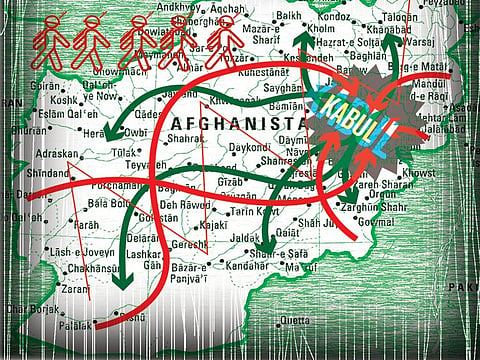India needs to be careful about involvement in Afghanistan
New Delhi should try to find a way to engage with Taliban in some limited form or manner

After the withdrawal of US forces from Afghanistan, Taliban takeover in many parts of the country looks eminent. More than three-fourths of Afghan territory is in Taliban’s complete control. In other parts of the war-ravaged nation, the rebel forces dominate militarily.
The Taliban have taken control of almost all the key border crossings and much of the country’s border. At present, Taliban forces are waging major attacks on several key cities, including Herat, Lashkar Gah, and Kandahar. The limited US air support and the opposition from the local tribal militia have somewhat delayed the Taliban advance, but the writing is already on the wall.
In the last week, China’s foreign minister has held a high-profile meeting with Taliban leaders. Though the US is apprehensive, it has welcomed China’s engagement with the Taliban. Beijing’s support for the Taliban, however, seems to have upset some policy wonks in India, as New Delhi was expecting China to stay away from the rebel group.
A powerful voice in India is also gaining momentum, advocating strong engagement in Afghanistan and even providing military support to the anti-Taliban forces.
A proactive role in Afghanistan?
The Biden administration may also be gently nudging India to play a proactive role in Afghanistan. However, India needs to be extremely careful before deciding to get into the Afghanistan whirlpool.
India’s engagement in Afghanistan has not achieved any big strategic purpose. India has no common border with Afghanistan; thus, its main reason to back a pro-Delhi government is to gain leverage vis-a-vis Pakistan. Similarly, Pakistan’s foremost strategy in Afghanistan is to have a pro-Islamabad dispensation in Kabul.
Afghanistan often ends up paying a price for this powerplay between the regional powers. For the last two decades, the government in Afghanistan has been India friendly, but it has not improved India’s security, particularly the situation in Kashmir.
New Delhi has spent at least $3 billion in Afghanistan in the last two decades, without any significant achievement. Let us not forget that the mighty US military and America's $2.3 trillion aid and assistance couldn’t even secure a government in Afghanistan.
So, when the US has exited Afghanistan and held talks with Taliban, what is the harm in India engaging and managing a working relationship with them? This might ensure a commitment by the Taliban, at least, to not provide direct or indirect support to any militant groupings in Kashmir.
China-Taliban meeting
Pertinently, China and the Taliban both see each other now as allies. They have no complicated history, and the Taliban hopes to get China’s support to protect it from international isolation. Pakistan also nudges the Taliban to develop better relations with China.
If China succeeds in bringing some political stability to Afghanistan, it will be seen as a significant landmark in China’s quest to become a global superpower as several superpowers have failed in Afghanistan in the past.
China has a strong relationship with Pakistan, and it has recently signed a 25-year treaty with Iran on economic and security cooperation. Getting Afghanistan under its wing will help China enlarge its influence in the West and Central Asia regions.
Post-war Afghanistan can provide possibilities for substantial economic investment. China also plans to extend its economic corridor with Pakistan to Afghanistan under its Belt Road Initiative.
Taliban’s history and ideology
Despite China’s better understanding of history, it also faces the risk of getting involved in the Afghanistan imbroglio. Considering Taliban’s history and ideology, the association may cause some discomfort to China at the global level.
However, the real challenge for Beijing will be how to restrain the Taliban directly or indirectly supporting religious militant groups in its territory. Pakistan has failed in the past on this front. Pakistan’s support to the Taliban has not stopped the Taliban from supporting militant groups in Pakistan in recent decades.
Despite all the assurances given by the Taliban to China, there is a possibility that this might not work on the ground.
In all probability India’s engagement in Afghanistan may not stop the Taliban from capturing Kabul in the long term, thus New Delhi should avoid going that way. Instead, it should try to find a way to engage with the Taliban in a limited manner.
Indian policymakers perhaps need to read Sun Tzu: “He will win who knows when to fight and when not to fight.”









